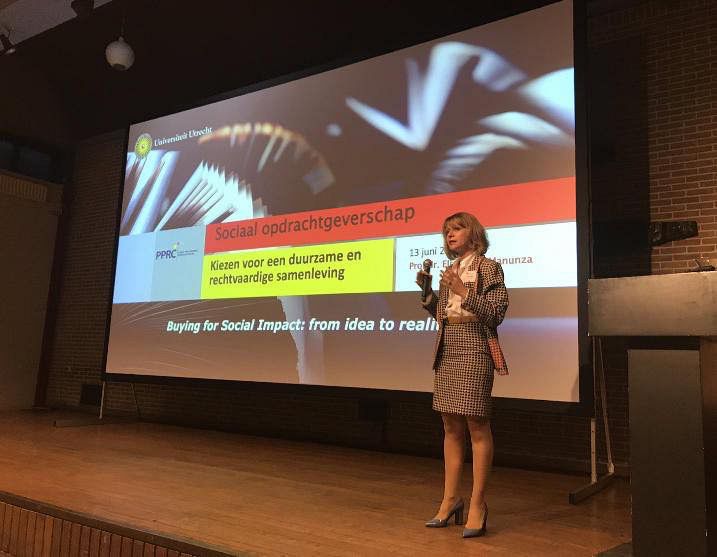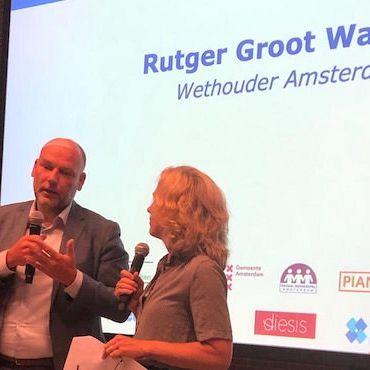"It is our aspiration that all people of Amsterdam with disabilities have an opportunity to become participants in our city"
Valuable conference
background
The conference was organized as part of the European project Buying for Social Impact (BSI) by the De Omslag foundation in collaboration with the municipality of Amsterdam, the Social Work Dome, Buy Social, NEVI and PIANOo. We welcome contributions from MVOI experts, PSO-the Netherlands and many others. The European BSI team consists of a network of public procurement and social economy experts in 15 EU countries.
Purchasing is a powerful means of getting people to participate in society. That is also the passion of the De Omslag foundation.
De Omslag has carried out research into the application of the social paragraph in government procurement. Conclusion: it has been implemented, but implementation is still pending.
opening and presentations
Bart Krull (Social Enterprise.nl and day chairman) and Corine van de Burgt (director st. De Omslag) are responsible for the kick-off.
politics
Amsterdam alderman Rutger Groot Wassink talks about the strong words in the coalition agreement. Together with companies and organizations, he wants to increase impact. A lot still needs to be done, including purchasing agreements. It is about 2.2 billion municipality of Amsterdam. The alderman has regularly cursed the tendering rules, but is looking forward to the result of the day: sharing in new strategies and thus increasing social returns.
government
Maarten Schuring, Secretary General of the Interior and Kingdom Relations, emphasizes the opportunities for jobs that can be achieved through government procurement. This idea gets hold of governments, but there is a lot of pressure on the financial side. He calls for upscaling; the purchase volume or large money demand large supply. So dare to think big, connect to big parties and ride the wide lane.
Europe
Natalia Fiedziuk (European Commission) underlines the importance of social procurement for the European Commission. Public procurement is an important tool for social impact. This is interpreted broadly, also as an answer to dealing with social challenges. It is striking that the culture surrounding purchasing must change: transparency, openness to the market and market consultations are important. There must be more awareness, knowledge and (technical) support; Security makes the difference for buyers.
science
Elisabetta Manunza shares her knowledge about social entrepreneurship and “therefore” also social commissioning. Governments buy in the service of society. What does that mean: sustainable and fair conduct of the contracting authority? She notes that we often stick to the economic model. So there is a struggle between social values ??and internal market rules and procurement law. According to Manunza, the focus should not be on purchasing, but on properly implementing social policy.

Javier Mendoza Jimenez outlines how the process of public procurement can be tough. Javier has designed a card game. He explains how legislation ensures that social enterprises are needed to meet the conditions set. The experience in Barcelona is that a lack of knowledge and certainty causes shudder. Can I do this, is that allowed, is that not contrary to the free market competition? That is why he designed a manual for reserved tenders: learning the rules of the game. This and the sharing in knowledge and awareness of social enterprises lowers the threshold.
Tips from social enterprise directors:
- Do that market survey
- Set quality above price, do not grant to the price fighters
- Facilitate the finding and deployment of the target groups.
Conclusion: It’s about knowing what your goal is
There is often a tension between the letter and the spirit of the law. The pressure from accountancy is sometimes great. We impose this on ourselves, because the procurement law is not at all so restrictive. The government must realize as much social added value as possible; that is the intention of Article 1.4, paragraph 2. Strictly speaking, the rules are not an obstacle to social purchasing. The most important themes were explored in two workshop rounds.
valuable day
The day ended with the conclusion that it was a valuable day in all respects. It was good that the social objectives of social procurement were highlighted in this way. The importance of professional commissioning became clear. It may be complex, but sharing knowledge and sharing opportunities helps. That certainly worked out well during this conference. We hope that we can learn together with each other, together with other cities and countries. That social purchasing and tendering will really become a movement.
_ If you give support from the top, it will yield a lot of results on #social purchasing #tip Maarten Schuring (BZK) _
_The most important themes were explored in two rounds of workshops. Below you will find all presentations, both from the plenary part and from the workshops.
Plenair presentatie 1: prof. dr. Elisabetta Manunza
Plenair presentatie 2: Javier Mendoza Jimenez
Workshops:
Workshop 1: Reserved assignments
Workshop 2: Case study Barcelona
Workshop 2: Social procurement municipality of Utrecht
Workshop 2: Best Practice Cycloon
Workshop 3: The Amsterdam approach
Workshop 4: Social Procurement Experimental Garden
Workshop 5: Inclusive entrepreneurship
Workshop 6: Social return as a catalyst part 1


